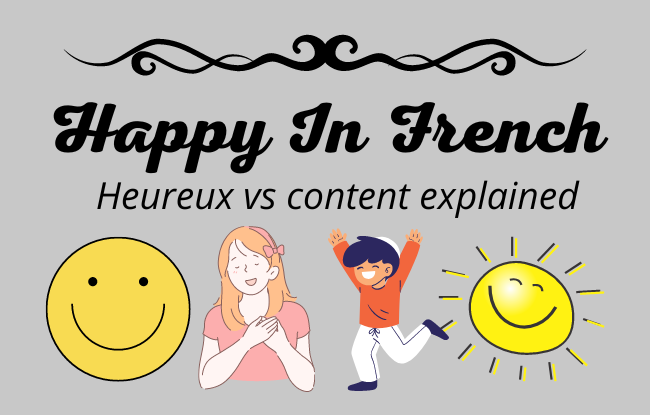Happy in French is “heureux” (pronounced uh-ruh). The feminine form is “heureuse” (pronounced uh-ruhz). Another French word for happy is “content”. This post will explore heureux vs. content in depth through lots of fun example sentences (with audio).

Heureux pronunciation
Beginners are almost always perplexed by how to pronounce heureux. My suggestion is to isolate the sounds. Read each “eu” as “uh” or the -e in the word “je” (I). Ignore the -h at the beginning of the word and simply insert the letter -r.
Thus, the pronunciation will be uh-ruh. To pronounce the feminine for (heureuse), simply add a -z sound to the end: uh-ruhz.
heureux, heureuse – [øʀø, øʀøz]
happy (masculine and feminine forms)
Heureux vs content
Before we go any further, it would be a good idea to clarify the difference between heureux and content. Both of these words mean “happy”. However, there is a very subtle difference between the two words.
Heureux often describes happiness on a deeper or more emotional level. For example, happiness in life or in a situation in life such as a relationship or job. For example:
Grace à Dieu je suis très heureux en ce moment.
Thank God, I’m very currently very happy.
The word content, however, has an underlying meaning of “content” or “satisfied” at the moment. For example:
Vous aimez la pizza? Vous êtes content?
Do you like the pizza? Are you happy (or satisfied)?
How to use heureux in a simple sentence
As mentioned above, the French use heureux to describe happiness on a deep emotional level. For example:
Je suis très heureux depuis mon changement de carrière.
I’ve been very happy since my career change.
Elle est très heureuse depuis la naissance de son fils.
She’s been very happy since the birth of her son.
Grammatical constructions using heureux
There are several ways to use the word heureux when constructing sentences. In this section we’ll look at several grammatical structures.
Être heureux de + infinitive = to be happy to do
To express, “being happy to do something”, use the following grammatical form: “Être heureux de + infinitive (to form of verb)“. This structure also translates to “to be happy about something”. Here are some examples:
- Je suis heureux de voyager en France. I’m happy to travel to France.
- Vous êtes heureux de vous revoir. You’re happy about seeing each other again.
Être heureux que + subjunctive
In the previous example, we looked at “to be happy to + verb”. Here, we’re looking at “to be happy that + person + verb”. This structure requires the usage of the subjunctive mood as it involved two different subjects separated by the word “que” and an element of emotion.
- Nous sommes heureux que vous veniez. We’rehappy you’re coming.
- Ils sont heureux que je puisse me débrouiller en français. They’re happy I can get by in French.
More on the word “content”
As mentioned, another word for happy is content (pronounced kɔ̃tɑ̃). “Content” also means happy but on a more superficial level. Another meaning of content is “satisfied”. Here are some example sentences:
Les enfants étaient très contents quand ils ont reçu les cadeaux.
The kids were very happy when they got the gifts.
This sentence uses the imperfect tense, which is a past tensed used for describing events.
Si t’es pas content, ne dit rien !
Don’t say anything if you’re not happy!
To express “being happy” for somebody, use “être content pour”. For example:
- Les parents sont très contents pour les jeunes mariés. The parents are very happy for the newlyweds.
Joyeux: Another word for happy in French
Another word for happy in French is “joyeux“ (pronounced ʒwajø). The feminine form or this adjective “joyeuse”. Here are some example sentences:
Nous passons un moment joyeux ensembe.
We’re having a happy moment together.


